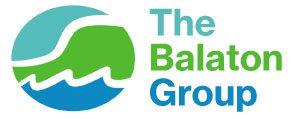Games
Information about games developed by members of the Balaton Group.
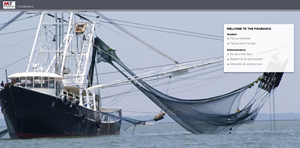
Fishbanks: A Renewable Resource Management Simulation
Developers: Dennis Meadows, John Sterman and Andrew King
Fishbanks is a multiplayer web-based simulation in which participants play the role of fishers and seek to maximize their net worth as they compete against other players and deal with variations in fish stocks and their catch. Participants buy, sell, and build ships; decide where to fish; and negotiate with one another. Policy options available to instructors include auctions of new boats, permits, and quotas.
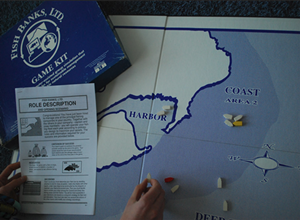
The Fish Banks Ltd. Board Game
Developer: Dennis Meadows
Fish Banks is a role-playing, board game where teams of players manage and operate their own fishing companies. Players step into the role of captains and crew members and compete against other fishing companies. Each fishing company begins each game with equal cash, fishing boats, and technology. Together the team players strategize about buying and selling ships, where to fish, how best to manage fleets without depleting fish stocks all while in competition with neighboring teams. The game, which incorporates variables such as deep-sea and coastal fishing, informs people about the careful and efficient use of natural resources.
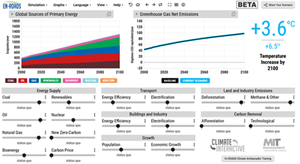
En-ROADS Climate Change Solutions Simulator
Developer: Climate Interactive, Ventana Systems, and MIT Sloan
En-ROADS is a transparent, freely-available policy simulation model that gives everyone the chance to design their own scenarios to limit future global warming. You can try your own experiments and assumptions, and get immediate feedback on the likely impacts. The simulation runs on an ordinary laptop in a fraction of a second, is available online, offers an intuitive interface, has been carefully grounded in the best available science, and has been calibrated against a wide range of existing integrated assessment, climate and energy models.
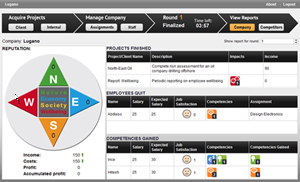
Green & Great Game
Developers: Centre for Systems Solutions (CRS) and the Center for Sustainability Transformation
Green & Great is a simulation game in which players assume the roles of managers in large consulting firms. Their companies compete for clients and seek to make a profit, while achieving social goals and reducing environmental impacts. By facing the consequences of their own decisions, players learn and experience the importance of business sustainability as a source of competitive advantage.
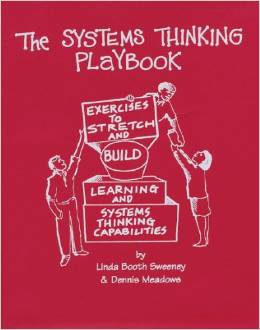
The Systems Thinking Playbook
Developers: Linda Booth Sweeney, Dennis Meadows
This book provides short gaming exercises that illustrate the subtleties of systems thinking. The thirty games are classified by these areas of learning: Systems Thinking, Mental Models, Team Learning, Shared Vision, and Personal Mastery. Each description clearly explains when, how, and why the game is useful. There are explicit instructions for debriefing each exercise as well as a list of all required materials. A summary matrix has been added for a quick glance at all thirty games. Every game works well and provokes a deep variety of new insights about paradigms, system boundaries, causal-loop diagrams, reference modes, and leverage points.
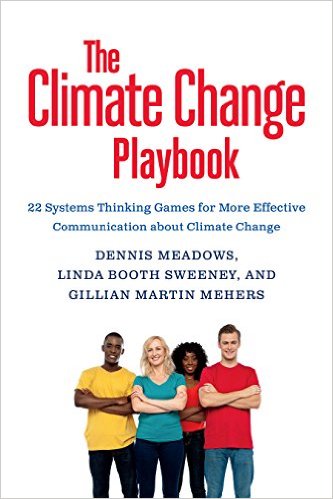
The Climate Change Playbook
Developers: Dennis Meadows, Linda Booth Sweeney, Gillian Martin Mehers
The simple, interactive exercises in The Climate Change Playbook can help citizens better understand climate change, diagnose its causes, anticipate its future consequences, and effect constructive change. Adapted from The Systems Thinking Playbook, the twenty-two games are now specifically relevant to climate-change communications and crafted for use by experts, advocates, and educators. Illustrated guidelines walk leaders through setting each game up, facilitating it, and debriefing participants. Users will find games that are suitable for a variety of audiences―whether large and seated, as in a conference room, or smaller and mobile, as in a workshop, seminar, or meeting.
More information; buy on Amazon; video of workshop by Dennis Meadows on using the Playbook, Part 1, Part 2.
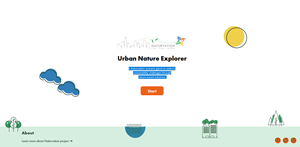
Urban Nature Explorer
Developers: Naturvation
As a web-based platform, the Urban Nature Explorer helps develop and visualize alternative nature-based solution (NBS) scenarios and assess their impact on selected urban sustainability challenges. The tool can be used in the early visioning stage of participatory planning processes. Its pilot version has been customized to a particular urban setting, but will be further developed to open the possibility of applying to any urban context.
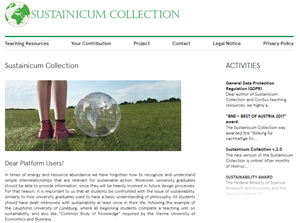
Sustainicum Collection
Developers: Helga Kromp-Kolb, Friedrich Zimmermann, Michael Narodoslawsky
The Sustainicum Collection is a project led by the BOKU (University of Natural Resources and Life Sciences Vienna). The platform aims to advance topics in University teaching that are relevant to Education for Sustainable Development (ESD), Sustainable Development Goals (SDG), and the 3 pillars of sustainability (ecological, economical and social topics) from the perspective of different disciplines. A variety of different types of teaching resources can be collected and searched for. These resources aim to support teachers both in terms of content and through the practical application of innovative teaching methods, as well as promote systemic and holistic thinking. University lecturers can use these resources for free and even submit their own resources in order to make them available to other colleagues.
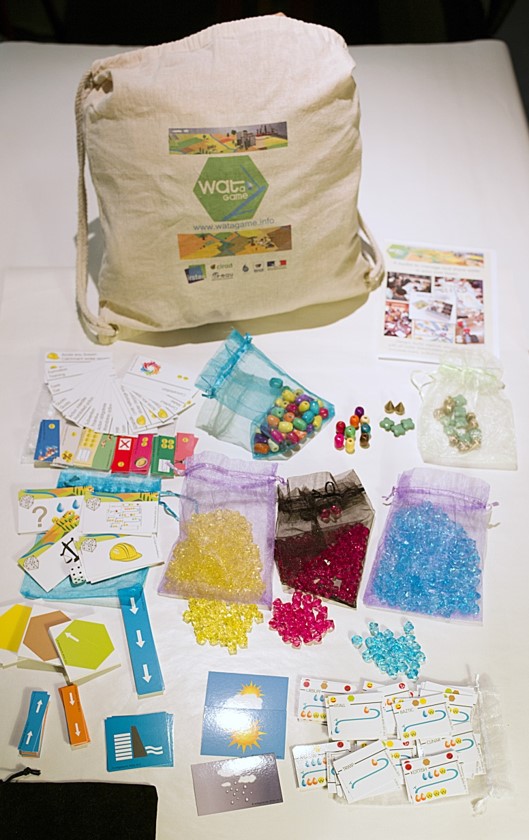
Wat-A-Game
Developers: researchers from the “Water Management, Actors, Territories” research unit in Montpellier (France).
Wat-A-Game is a tool for building and playing non-computerized role-playing games on water and land management. By building the game, modelers can represent a specific territory through different plots, choose which roles the players will embody (farmers, decision-makers, citizens, fishers, etc.), define which activities players will be able to do and with which resources (water, sediment, biodiversity, information, etc.). The manipulation of simple elements (pebbles for resources, cards of different colors for plots and rivers) allows to design the game while playing it. Since its creation in 2008, Wat-A-Game was used to build more than 100 role-playing games on different issues (e.g. ecosystem services MyRiverKit, sanitation Waste-WAG) and different territories (e.g. Têt watershed in France Eau en Têt, MpanGa river in Uganda MpanGame). Wat-A-Game is part of a larger family of participatory tools called CoOPLAGE designed to support public decision-making.
